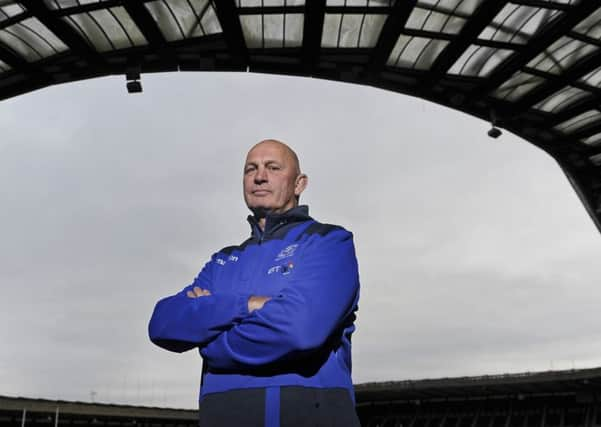Departing Scots coach Vern Cotter keeps his mind on the job


Vern Cotter named his squad for the 2017 Six Nations tournament, which will prove to be his last act as Scotland coach, and, while the Kiwi made clear last autumn that he would have preferred to stay and continue the work begun in the summer of 2014, as partings go it bodes to be fairly painless one come the end of the season when he heads off to a lucrative job back in his beloved France with Montpellier and Gregor Townsend takes over the Scotland reins.
Cotter is, to put it mildly, not a man to bask in the limelight and sought to repel any personal angle to this final challenge at the Scotland helm and insisted that his only thoughts were on that first match at home to Ireland, which will open the competition on 4 February, and backing up what was a relatively successful autumn.
Advertisement
Hide AdAdvertisement
Hide AdThat said, he refused to be a shrinking violet when asked how he thought Scotland had progressed under his leadership. “I think all over,” was his blunt reply.
“A lot of work we have being doing is on identity culture and behaviour. You transfer that to your mindset and skills set.
“Our players have, hopefully, become more skilful. Our leadership group has grown and helped develop the game. The players spend more time together and have learned from experience.
“It has been great fun and the team has grown in confidence. We are not dabbling in games now, we have a clear plan and strategy and try and stick to it.
“The only thing that matters is winning. Quantify it? I can’t. Maybe a few statistics will show it, but I have enjoyed it thoroughly.”
The changes most prominent on Cotter’s mind were not those coming in terms of coaching personnel but the ones which may have a bearing on matches this season, namely the introduction of try bonus points for the first time in rugby’s oldest international tournament and the new, more punitive high tackle laws introduced by World Rugby.
“I’m trying to keep emotion away from all this,” said Cotter. “We’ve enjoyed players continuing to perform well since the autumn Tests. We always looked for continuity in this, that this would be eight games [over the season] so the message has been pretty clear to players. I haven’t thought about the last game, I’m only focused on the first one, and that’s Ireland.
“Are bonus points going to change the way some teams play? It probably will, you’ll see a few more risks in the game. This Six Nations will be slightly different than others and you’ve got the ref’s interpretation of high tackles we have to negotiate. There may be games we have to play with 14 men. I hope not, but these things have to be taken into account.”
Advertisement
Hide AdAdvertisement
Hide AdOne obvious step forward under Cotter has been Scotland’s ability to deliver tries more regularly than the welcome surprises of old and the coach revealed that plans would be in place to ensure that the side were adaptable to the new bonus-point era. “We have options to change the game if we need to score more tries to get an extra bonus point. There may be different choices,” said Cotter, who elaborated that one gambit could be, say, dropping someone like centre Huw Jones back to full-back and bringing attacking spearhead Stuart Hogg forward if a fourth-try hunt was on. Hogg started for Glasgow at No 10 in Treviso recently and Cotter added: “I was pleased to see that. It was Gregor’s initiative. We looked at in the autumn and in bits and pieces and perhaps Hoggy has mentioned that to him as well. That is another option.
“Gregor was able to explore that option and give Hoggy that opportunity. Hoggy shifting from 15 to 10 is not so bad.”
Cotter admitted that back-row and centre were looming as the most difficult selection scenarios, with the return of free-scoring Gloucester centre Matt Scott adding yet another option to that stacked midfield pot.
Scott was a surprise omission from the autumn series and Cotter explained that the concerns then were over perceived defensive deficiencies: “We had concerns about it his decision-making,” said the coach of the 36-times capped former Edinburgh player. “He has worked on that and does not isolate himself so much.
“It’s not what you say, it’s what you do. He’s been working on some of the defensive work he’s had to do, making better decisions and staying in systems. It says something of the man that he’s been able to take these things on and he’s got better at it.
“I wouldn’t say it’s fully done, and we’re not going to tell a player that. There have been improvements and he’s doing a good job of rectifying. He has been working on that at Gloucester and we will be putting pressure on him too when he comes into camp.”
That camp begins next week when the Scotland squad again assemble at the new state-of-the-art Oriam centre at Edinburgh’s Heriot-Watt University. Cotter was quick to credit the facility in the wake of the autumn series, which saw a narrow loss to Australia followed up by wins over Argentina and Georgia, and is hoping it helps provide an equally profitable training environment ahead of the Six Nations.
“Oriam has been a great facility and has changed everything,” said Cotter. “Last year [ahead of the Six Nations] we went up to St Andrews and it was raining with horizontal wind. Now we can work on skills sets indoors in a positive environment.”